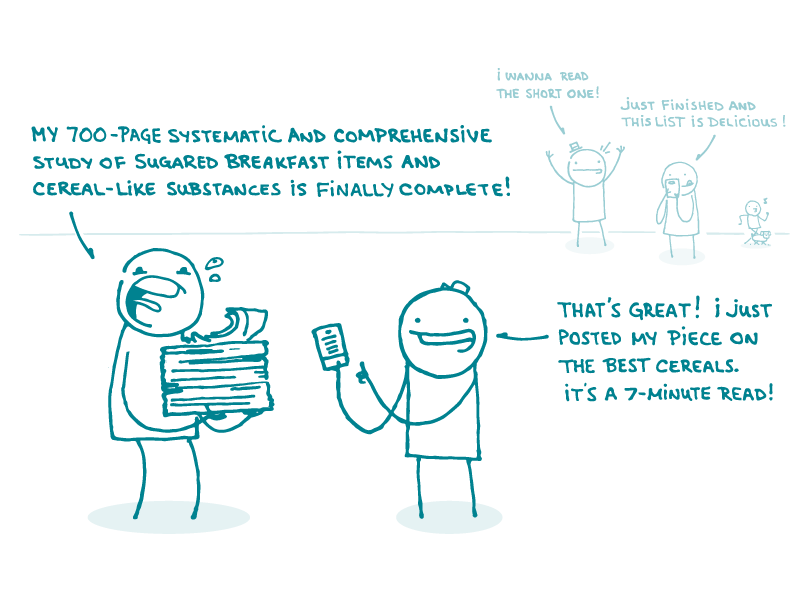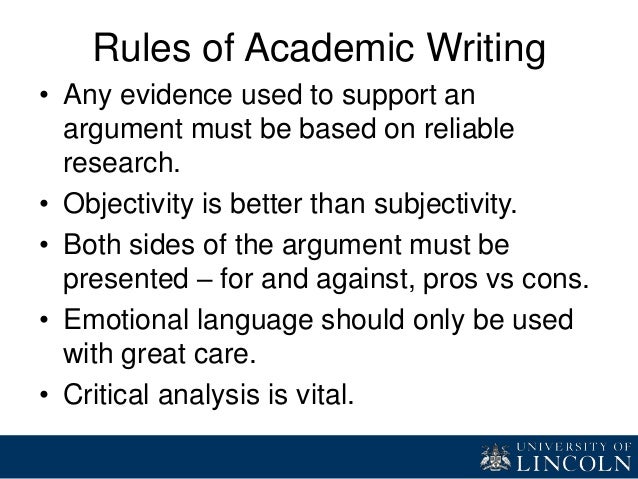
We have a tendency to use WE when I is a good option (i.e. the author is one person) as in " We present data from a academic papers " " We may then conclude that (a) " etc. or in cases like The use of the authorial 'we' is very common in academia even for single-author papers, as argued by many and properly referenced in the other question that you mention. Personally, I would keep 'we' also for the thesis without bothering · "The findings suggest" is an example of an overused phrase in academic writing. Photo by José Alejandro Cuffia on Unsplash. Verbs based on purpose of use. Dr. Elaine Khoo, from The Writing Centre at the University of Toronto at Scarborough, offers the following suggestions for academic verbs to use based on the intent of your sentence
Can I use we in a paper? - Blog About Academic Writing
Academic writing is a formal style of writing used in universities and scholarly publications. Academic writing follows the same writing process as other types of texts, but it has specific conventions in terms of content, structure and style. Table of contents Types of academic writing Academic writing is… Academic writing is not… Academic writing checklist.
Academics mostly write texts intended for publication, such as journal articles, reports, books, and chapters in edited collections. For students, the most common types of academic writing assignments are listed below. Different fields of study have different priorities in terms of the writing they produce. However, all academic writing shares certain key principles intended to help convey information as effectively as possible.
Academic use of we in academic writing aims to convey information in an impartial way. All claims should be supported with relevant evidence, not just asserted. This means clearly outlining your methodology and being honest about the limitations of your research, use of we in academic writing. The formal style used in academic writing ensures that research is presented consistently across different texts, so that studies can be objectively assessed and compared with other research.
Avoid informal languageincluding slang, contractionsclichés, and conversational phrases:. This means being as specific as possible and avoiding vague language :. Reflect on your word choice to ensure it accurately and directly conveys your meaning:. Specialist language or jargon is common and often necessary in academic writing, use of we in academic writing, which generally targets an audience of other academics in related fields.
However, jargon should be used to make your writing more concise and accurate, not to make it more complicated. A specialist term should be used when:. The best way to familiarize yourself with the kind of jargon used in your field is to read papers by other researchers and pay attention to their language.
An academic text is not just a collection of ideas about a topic—it needs to have a clear purpose. Start with a relevant research question or thesis statementand use it to develop a focused argument.
Only include information that is relevant to your overall purpose. A coherent structure is crucial to organize your ideas. Pay attention to structure at three levels: the structure of the whole text, paragraph structure, and sentence structure.
Academic writing uses sources to support its claims. Sources are other texts or media objects like photographs or films that the author analyzes or uses as evidence. Many of your sources will be written by other academics; academic writing is collaborative and builds on previous research. For example, citing Wikipedia is typically discouraged. You must always cite your sources in academic writing. There are many different citation styles with different rules.
The most common styles are APAMLAand Chicago. Make sure to consistently follow whatever style your institution requires.
APA Citation Generator MLA Citation Generator. In some cases there are several acceptable approaches that you can choose between—the most important thing is to apply the same rules consistently, use of we in academic writing, and to carefully proofread your text before you submit. Academic writing generally tries to avoid being too personal.
Information about the author may come in at some points—for example in the acknowledgements or in a personal reflection—but for the most part the text should focus on the research itself. When you refer to yourself, use of we in academic writing should be for good reason.
You can position yourself and describe what you did during the research, but avoid arbitrarily inserting your personal thoughts and feelings:. If a term can be cut or replaced with a more straightforward one without affecting your meaning, it should be. Avoid redundant phrasings in your text, and try replacing phrasal verbs with their one-word equivalents where possible:.
An academic text is not the same thing as a literary, use of we in academic writing, journalistic, or marketing text. Specifically, you should avoid appeals to emotion and inflated claims. Avoid using emotive or subjective language :. Students are sometimes tempted to make the case for their topic with exaggeratedunsupported claims and flowery language. Use the checklist below to assess whether you have followed the rules of effective academic writing.
I avoid informal terms and contractions. I avoid redundant words and phrases. I use appropriate transitions to show the connections between my ideas. My text is logically organized using paragraphs. Each paragraph is focused on a single idea, expressed in a clear topic sentence. Every part use of we in academic writing the text relates to my central thesis or research question.
I use the appropriate verb tenses in each section. I consistently use either UK or US English. I format numbers consistently.
I cite my sources using a consistent citation style. Your text follows the most important rules of academic style. Make sure it's perfect with the help of a Scribbr editor! Have a use of we in academic writing expert improve your writing.
Check your paper for plagiarism in 10 minutes. Do the check. Generate your APA citations for free! APA Citation Generator. Home Knowledge Base Academic writing. The dos and don'ts of academic writing Academic writing is a formal style of writing used in universities and scholarly publications. Academic writing is… Academic writing is not… Formal and unbiased Clear and precise Focused and well-structured Well-sourced Correct and consistent Personal Long-winded Emotive and grandiose Table of contents Types of academic writing Academic writing is… Academic writing is not… Academic writing checklist.
I avoid emotive or exaggerated language. I avoid unnecessary jargon and define terms where needed. I present information use of we in academic writing precisely and accurately as possible. I support my claims with evidence. Well done! Learn more about our academic editing services Return to checklist. Is this article helpful?
Other students also liked. Taboo words in academic writing Academic writing should be correct, concise and precise. Avoid using language that is too informal, vague, exaggerated, or subjective. How to write more concisely Academic writing is mose effective when it is concise and direct. Shorten your sentences by cutting inflated phrases and redundancies. Transition words and phrases in academic writing Transition words and phrases link together different ideas in your text.
Using them effectively helps the reader to follow your arguments. Formal and unbiased Clear and precise Focused and well-structured Well-sourced Correct and consistent. Personal Long-winded Emotive and grandiose. A fairly short, self-contained argument, often using sources from a class in response to a question provided by an instructor.
A more in-depth investigation based on independent research, often in response to a question chosen by the student. A critical synthesis of existing research on a topic, usually written in order to inform the approach of a new piece of research. Always include an introduction and a conclusion. Divide longer texts into chapters or sections with clear headings. Make sure information is presented in a logical order. Start a new paragraph when you move onto a new idea.
Make sure every paragraph is relevant to your argument or question. Use transition words to express the connections between different ideas within and between sentences.
Use appropriate punctuation to avoid sentence fragments or run-on sentences. Use a variety of sentence lengths and structures. Smith, J. Statistical analysis methods 2nd ed. New York, NY: Norton.
Can I use \
, time: 5:50Should I Use "I"? – The Writing Center • University of North Carolina at Chapel Hill

We have a tendency to use WE when I is a good option (i.e. the author is one person) as in " We present data from a academic papers " " We may then conclude that (a) " etc. or in cases like · Can I use we in a paper? Yes, it’s acceptable to use we in your paper to refer to you and your co-authors. Whether you use first person pronouns or not is a writing style choice, which is yours to make. Of course, if your publisher’s guidelines for authors say don’t use I or we in your manuscript, do avoid using I or we What this handout is about. This handout is about determining when to use first person pronouns (“I”, “we,” “me,” “us,” “my,” and “our”) and personal experience in academic writing. “First person” and “personal experience” might sound like two ways of saying the same thing, but first person and personal experience can work in very different ways in your writing
No comments:
Post a Comment